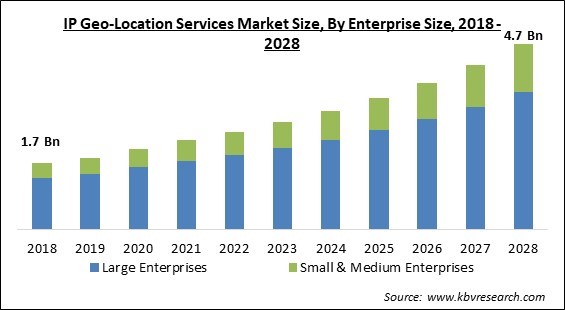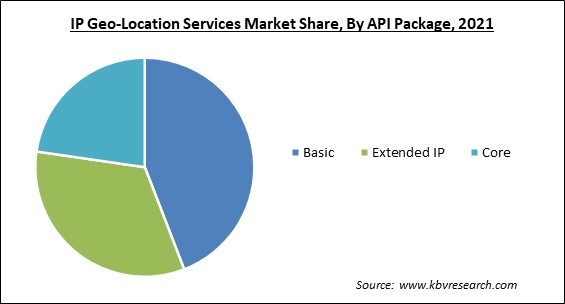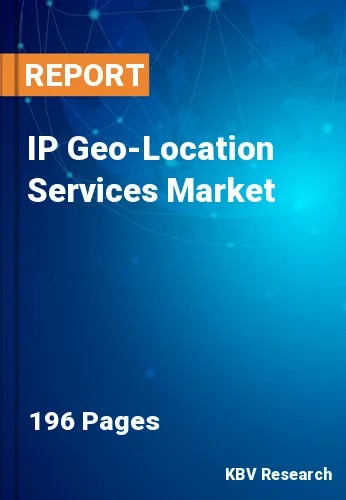The Global IP Geo-Location Services Market size is expected to reach $4.7 billion by 2028, rising at a market growth of 11.3% CAGR during the forecast period.
The technique of connecting a physical place with an online network interface is made easier by Internet protocol (IP) geo-location services. These services make it easy to locate the latitude, longitude, country, region, city, and other information associated with an IP address. IP geo-location services are used for various purposes, including preventing Sybil attacks, identifying website visitors, and putting geographic restrictions on web content, all of which impact the market.

Due to an increase in machine learning (ML) applications and the widespread use of smartphones, the IP geo-location services market is anticipated to expand significantly throughout the forecast period. In addition, the market has expanded due to the growing demand for location-based intelligence. Geo-location produces a set of geographic coordinates like longitude and latitude in a specific map datum.
Positions may alternatively be described as a direction and range from a recognized landmark. Positions can then be used to pinpoint a specific location, like street address. Certain common examples of geo-location include internet geo-location, which geo-locates a device linked to the internet; animal geo-tracking, which involves determining an animal's location; positioning systems, which determine geographic positions generally; and mobile phone tracking.
Internet protocol aids in the transfer of data on the internet between any two or more computers. Every computer linked to the internet has an IP address that distinguishes it from every other computer. Internet protocol version 4 (IPv4) is currently the most used version of IP, while IPv6 is quickly gaining traction in the market. IP geo-location is locating a visitor's physical location and analyzing their internet connection to provide the best user experience and decide on a business strategy.
The COVID-19 pandemic triggered crises in the economic, social, and energy sectors, the medical field, and other industries. Millions of organizations worldwide have been compelled by COVID-19 to implement remote work policies. The change has caused the demand for solutions to assist remote teams and workflows in rising quickly. The COVID-19 outbreak positively affected the development of the IP geo-location services market due to increased connected device use, rising government attempts to provide digital security and rising levels of digital dependency.
Designs can be located based on the geography of the first requester by the relevant ML step. This information may be useful for companies trying to grow in locations where geo-location data suggest widespread public interest. It could also assist them in choosing the optimal spot for a board sign. IP geo-location service providers currently use AI & ML algorithms to provide user location accuracy and protection from fraudulent transactions. OTT and e-commerce firms are now utilizing IP geo-location services to provide their consumer bases with secure online platforms. Such factors ensure the growth of the IP geo-location services market in the coming years.

It is anticipated that demand for IP geo-location services for ad targeting will increase during the forecast period as more organizations turn to sophisticated automation tools to accomplish their geo-location-based marketing goals. Demand for content localization based on distinct consumer preferences has increased with the development of digital marketing & its applications, like business analytics as well as search pattern reformation. Applications for the Internet of Things can now connect to internet services due to the emergence of the IPv6 addressing scheme. All these factors are propelling the growth of the IP geo-location services market.
Internet users can disguise their real IP address and change to any arbitrary IP address using a VPN service to conceal their true location. As a result of increased competition amongst VPN service providers and the prevalence of internet users who conceal their location, this service is becoming more reasonably priced. For premium services, many VPN companies offer four to five layers of security. However, by masking users' real locations, these security layers have a negative effect on IP geo-location services. As more VPN service providers emerge, they pose a danger to IP geo-location services since they enable users to conceal their identities. All such elements work together to hamper the growth of the market.
Based on API package, the IP geo-location services market is categorized into basic API packages, core API package, and extended IP geo-location API. The basic API package segment garnered the highest revenue share in the IP geo-location services market in 2021. The discrete document object concepts that comprise the basic API packages can reasonably represent web URLs. These API services are significant because they provide companies’ access to their customers' detailed locations data at the city or district level. In addition, leveraging a basic API package user is a more Packdependable and useful way to communicate with an API than generating HTTP requests and decoding answers.
On the basis of enterprise size, the IP geo-location services market is divided into small & medium enterprises and large enterprises. The SMEs segment recorded a significant revenue share in the IP geo-location services market in 2021. Companies classified as small and medium-sized enterprises (SMEs) have workforce sizes of usually less than 1,000. SMEs frequently have limited internal IT resources, cash resources, and IT skills. Profitability and long-term viability are the main concerns of every SME. Such businesses are important local actors well known for supplying goods under local demand.
Based on application, the IP geo-location services market is segmented into localize web content, fraud detection, target advertisement, digital rights management, and others. The digital rights management segment witnessed the maximum revenue share in the IP geo-location services market in 2021. To assist restrict the distribution of marketable digital assets, DRM systems were developed. Since it is nearly hard to regulate and control the distribution of these data once they have been duplicated, DRM technology focuses on preventing the theft of these assets in the first place. DRM tools can also assist in limiting content access to specific IP addresses, regions, or domains when IP geo-location information is implemented.
| Report Attribute | Details |
|---|---|
| Market size value in 2021 | USD 2.2 Billion |
| Market size forecast in 2028 | USD 4.7 Billion |
| Base Year | 2021 |
| Historical Period | 2018 to 2020 |
| Forecast Period | 2022 to 2028 |
| Revenue Growth Rate | CAGR of 11.3% from 2022 to 2028 |
| Number of Pages | 196 |
| Number of Tables | 359 |
| Report coverage | Market Trends, Revenue Estimation and Forecast, Segmentation Analysis, Regional and Country Breakdown, Companies Strategic Developments, Company Profiling |
| Segments covered | API Package, Enterprise Size, Application, Region |
| Country scope | US, Canada, Mexico, Germany, UK, France, Russia, Spain, Italy, China, Japan, India, South Korea, Singapore, Malaysia, Brazil, Argentina, UAE, Saudi Arabia, South Africa, Nigeria |
| Growth Drivers |
|
| Restraints |
|
On the basis of region, the IP geo-location services market is analyzed across North America, Europe, Asia Pacific, and LAMEA. The North America segment procured the highest revenue share in the IP geo-location services market in 2021. Due to the U.S.'s huge industrial base, as well as government initiatives to foster innovation, urbanization, and improvements in smart homes & IoT services, North America has the highest growth potential. The U.S. is where IP geo-location services in North America are growing the fastest. Therefore, the demand for IP geo-location services is expanding owing to rising government attempts to reduce data breaches and expanding location monitoring applications.
Free Valuable Insights: Global IP Geo-Location Services Market size to reach USD 4.7 Billion by 2028
The market research report covers the analysis of key stake holders of the market. Key companies profiled in the report include Pitney Bowes, Inc., Akamai Technologies, Inc., Apilayer Data Products GmbH (Idera, Inc.), BigDataCloud Pty Ltd., Tibco Software, Inc. (Vista Equity Partners), Geobyte, Hexasoft Development Sdn. Bhd. (IP2Location), Foundry (KickFire, Inc.), MaxMind, Inc., and Neustar, Inc. (TransUnion LLC).
By API Package
By Enterprise Size
By Application
By Geography
The global IP Geo-Location Services Market size is expected to reach $4.7 billion by 2028.
Utilizing ML algorithms to increase interest in IP geo-location services are driving the market in coming years, however, Increased VPN use reducing the accuracy of IP geo-location services restraints the growth of the market.
Pitney Bowes, Inc., Akamai Technologies, Inc., Apilayer Data Products GmbH (Idera, Inc.), BigDataCloud Pty Ltd., Tibco Software, Inc. (Vista Equity Partners), Geobyte, Hexasoft Development Sdn. Bhd. (IP2Location), Foundry (KickFire, Inc.), MaxMind, Inc., and Neustar, Inc. (TransUnion LLC).
The expected CAGR of the IP Geo-Location Services Market is 11.3% from 2022 to 2028.
The Large Enterprises segment is leading the Global IP Geo-Location Services Market by Enterprise Size in 2021 thereby, achieving a market value of $3.5 billion by 2028.
The North America market dominated the Global IP Geo-Location Services Market by Region in 2021, and would continue to be a dominant market till 2028; thereby, achieving a market value of $1.7 billion by 2028.
Our team of dedicated experts can provide you with attractive expansion opportunities for your business.

